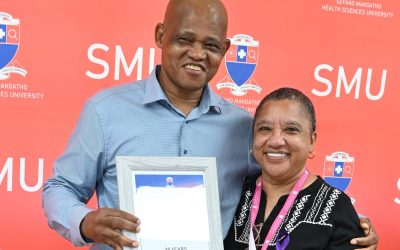In a landmark achievement for Sefako Makgatho Health Sciences University (SMU), PhD candidate Thabo Lesiba Lekgoathi has successfully filed a provisional patent for a novel compound derived from a medicinal plant, demonstrating significant activity against respiratory diseases, including COVID-19. This innovation, developed under the mentorship of Dr Vuyisile Thibane and Professor Stanley Gololo in the Department of Biochemistry and Biotechnology under the School of Science and Technology (SST), exemplifies SMU’s commitment to pioneering research that bridges indigenous knowledge with modern scientific advancements.
 The Technology Transfer Office (TTO) at SMU facilitated the patent filing process, highlighting the university’s dedication to translating research into tangible health solutions. This development not only underscores SMU’s role in addressing pressing health challenges but also positions the institution at the forefront of innovation in the health sciences sector.
The Technology Transfer Office (TTO) at SMU facilitated the patent filing process, highlighting the university’s dedication to translating research into tangible health solutions. This development not only underscores SMU’s role in addressing pressing health challenges but also positions the institution at the forefront of innovation in the health sciences sector.
Lekgoathi’s research centres on Schinus molle, a plant traditionally used in rural communities to treat colds and flu-like symptoms. Through meticulous analysis, he identified geranylgeranyl acetate, a diterpenoid extracted from Schinus molle, which exhibits inhibitory effects on key SARS-CoV-2 protease enzymes, PLpro and Mpro. These enzymes are critical for viral replication and immune system suppression. By inhibiting them, geranylgeranyl acetate disrupts the virus’s ability to mature and allows the immune system to remain active.
“The compound’s ability to inhibit broad targets of the virus makes it unique,” Lekgoathi explains. “Its volatile nature allows for administration through an oil-based formulation which has been enriched with the compound and/or through pelletized extracts which can be deposited into a hot water system for inhalation, potentially offering a natural, accessible treatment for respiratory symptoms associated with SARS-CoV-2 infection.”
The journey from concept to provisional patent was not without challenges. Lekgoathi faced infrastructural limitations and personal hardships, including the loss of loved ones to COVID-19. Despite these obstacles, he remained resolute. “Computational studies helped narrow down the search for a novel active compound, which would have been an expensive exercise through other methods,” he notes.
Securing a provisional patent for this compound is a pivotal step, in safeguarding the intellectual property and facilitating further development. The TTO at SMU played an instrumental role in this process. “The TTO provided essential resources, including legal expertise, ensuring that the patent application was properly structured,” Lekgoathi acknowledges.
Looking ahead, the focus is on conducting analytical tests such as toxicity studies to validate the compound’s efficacy and safety. Exploring various formulations and delivery methods will be crucial to ensure practical application. Lekgoathi envisions potential partnerships with pharmaceutical companies and government agencies to support the development, testing, and commercialisation of this compound. “This innovation has the potential to make a significant contribution to global health by offering a natural, accessible, and effective treatment for respiratory infections,” he asserts.
Dr Esmey Moema, Operations Manager of the SST at SMU, emphasises the broader implications of this achievement. “This accomplishment is a powerful reflection of the school’s evolving research strategy, aligned with innovation-driven outputs and the potential for commercialisation,” she states. “It underscores our commitment to advancing translational research that contributes to health security and economic development.”
This development not only highlights the potential of indigenous plants in modern therapeutics but also positions South Africa’s biotechnology and pharmaceutical industries for growth. By bridging traditional knowledge with scientific research, Lekgoathi’s work exemplifies the transformative impact of integrating cultural heritage with contemporary science.
By Tumelo Moila



